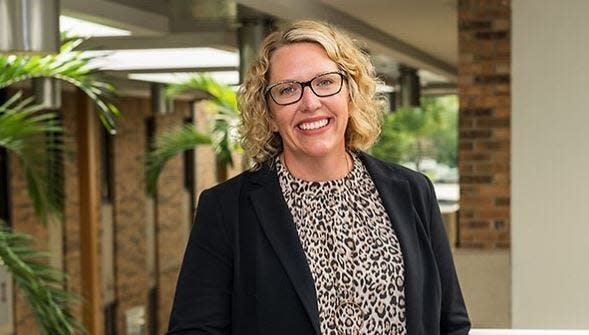Lenawee County starting program aimed at reducing mentally ill people in justice system
ADRIAN — Lenawee County is implementing a new program called Stepping Up, which applies a systems-based approach with the goal of reducing the number of individuals with mental illness and related disorders in the criminal legal system.
Approximately 2 million times each year, people who have serious mental illnesses are admitted to jails across the nation. Almost three-quarters of these adults also have substance use disorders. Once incarcerated, individuals with mental illnesses tend to stay longer in jail and, upon release, are at a higher risk of returning to incarceration than people without these illnesses, the national Stepping Up initiative reports.
"But this problem doesn’t just lie with jails," according to Stepping Up's website. "Many community members who interact with the justice system are also in repeated contact with 911 dispatch, emergency rooms, homeless services, and behavioral health clinics — cycling through costly services that rarely provide the long-term care and support they need. As a result, local systems are overwhelmed with challenges that limit their ability to serve community members comprehensively and effectively."
The Stepping Up initiative was launched in 2015 as a partnership between The Council of State Governments Justice Center, the National Association of Counties and the American Psychiatric Association Foundation.
Since then, Stepping Up has provided more than 500 counties with resources and tools to address the prevalence of mental illness and related substance use disorders in local justice systems.
The Center for Behavioral Health and Justice at the Wayne State University School of Social Work is now working with Lenawee County on its implementation of the Stepping Up program. The center has provided Stepping Up technical assistance to 16 other counties in Michigan: Antrim, Calhoun, Cheboygan, Delta, Emmet, Hillsdale, Jackson, Macomb, Ogemaw, Ottawa, Charlevoix, Eaton, Genesee, Grand Traverse, Muskegon and Washtenaw.
“We strive to tailor our assistance to the needs of each county while remaining true to the mission of Stepping Up National,” Nikayla Williams, project coordinator for the Center for Behavioral Health and Justice at the Wayne State University School of Social Work, said.

Numerous counties in Michigan endorsed the initiative beginning in 2015 with their county commissions passing a resolution. Wayne State has not provided technical assistance to all the counties that have passed a resolution. It began its technical assistance with Lenawee’s neighboring counties of Hillsdale, Jackson and Washtenaw in 2018 and 2019.
A county-level commitment from the county commission that passes the Stepping Up resolution, the sheriff’s office, the county jail captain and jail administrator as well as the local community mental health agency is required to pursue technical assistance with Wayne State, Williams said.
“We like to think of this from a system-level perspective because that is where a solid foundation can be developed or built upon to support those experiencing mental illness and co-occurring disorders,” Williams said. “Counties often lack sufficient data and technical expertise to effectively engage in the cross-system, outcome-oriented planning necessary to move forward with the initiative. Cross-system collaboration and data-driven decision making improve continuity of care which is essential to effectively serve this population.”
Through Wayne State’s Stepping Up technical assistance, its county partners have been able to implement a standardized screening process to enhance identification, referral and services for those with mental illness and co-occurring disorders.
The center has also been able gather baseline data on prevalence, length of stay and connection to care for people experiencing mental illness and co-occurring disorders within each of its partner county jails. This baseline data has been used to demonstrate needs for grant funding, county millages and increased budget allocations. Wayne State has helped its partners develop integrated reports to be able to continue to track progress over time. These reports have also been used to fulfill grant reporting requirements.
“We aim to make our technical assistance as seamless as possible for county partners, especially those working within the county’s jail as that is where the majority of the technical assistance lift tends to happen,” Williams said. “This is also why we tailor it to the needs and capacity of the county. We know that many jails are understaffed, so the last thing we want is to make more work for them.”
In a May 2020 report, the Center for Behavioral Health and Justice recommended:
Encouraging more counties to pass a Stepping Up resolution and to create a committee to focus on the Stepping Up framework.
Encouraging jails to implement standardized mental health and substance use screening tools at booking, ideally into their jail management system, to effectively identify those in need of services as well as officer training in identification.
Modifying and formalizing protocols for identifying, referring and serving individuals with behavioral health concerns to ensure timely and appropriate services. Interventions should consider serious mental illness, substance use disorders and additional risk factors such as homelessness and recidivism.
Identifying and reducing barriers to data integration and collection among county jails and behavioral health providers.
Last year, in Monroe County, a longtime partner of Wayne State, the Monroe Community Mental Health Authority, which has been working with the Monroe County Sheriff's Office, announced the county's jail diversion efforts had reduced recidivism and repeat offenses by 37% for incarcerated individuals suffering from serious mental illness, the The Monroe News reported.
In 2016, after a near fatal encounter involving an individual in a mental health crisis headed down a busy road toward a populated area with a knife, Washtenaw County Sheriff Jerry Clayton and Washtenaw County Community Mental Health executive director Trish Cortes decided to increase collaboration.
As a result, the county began co-training to teach law enforcement how to respond to a person in a mental health crisis. WCCMH also began riding along with law enforcement and law enforcement came to ride along with WCCMH’s mobile crisis team to build partnership and collaboration.
“Officers de-escalated the situation and it was safely resolved, but it highlighted how we needed to partner more effectively together,” Lisa Gentz, WCCMH program administrator for public safety mental health millage initiatives and jail mental health, said.

Policy Research Associates, a Delmar, New York-based behavioral health and research firm, completed sequential intercept mapping in 2017 to identify gaps in diverting individuals from the criminal legal system and to provide a strategy for Washtenaw County to build up its diversion options.
As a result of the mapping, WCCMH created a diversion council and went before the Washtenaw County Board of Commissioners, which voted to become a Stepping Up community. Shortly thereafter in 2017, the county put a millage on the ballot, which was approved by a 2-to-1 margin.
In 2019, the county began receiving funding from the millage. It is shared between Washtenaw County Sheriff’s Office and WCCMH. It is an eight-year millage at 1 mill, generating approximately $6 million for WCSO and WCCMH per year. It runs through 2026.
Millage-funded programs include a broad array of initiatives, but among the most important is access to mental health and substance use recovery services for all Washtenaw County residents who are having difficulty accessing private care, regardless of their insurance status or ability to pay for services.
In addition to assessment, stabilization and treatment services for county residents, the millage funds:
Mental health awareness, prevention and early intervention programs.
Crisis response programs designed to divert individuals with mental health and substance use disorders from jail, emergency departments and inpatient stays whenever possible.
Treatment and support for individuals in the justice system including incarcerated individuals, individuals on probation and individuals preparing for successful community re-entry.
Expanded education and training for first responders, including police officers and firefighters.
Supportive housing initiatives.
In Lenawee County, the county commission passed a resolution in 2016 to become a Stepping Up community. Little was done on the effort until this year when the Lenawee Community Mental Health Authority, sheriff’s office and county jail, and the Center for Behavioral Health and Justice began partnering to implement the program.
“We know that people with mental health issues are more likely to end up in jail. They are more likely to reoffend after their release, and we also know that incarceration doesn’t really help mental illness,” Jackie Bradley, community outreach/compliance program director and fair hearings officer for LCMHA, said. “The whole intent of the program is to find other ways to help folks because oftentimes communities feel like jail is the only tool in their toolbox once people get to a certain point. So Stepping Up builds out some other tools for us to use.”

Stepping Up is based on a whole model. To the fullest extent it would go all the way from first contact and crisis hotlines through contact with law enforcement up through diversion of charges and diversion programs, Bradley said.
“Certainly, here in Lenawee County we have pieces of those things. We have our enhanced treatment courts, we have our 24-hour CMH crisis line, but we don’t really have a comprehensive continuum all the way along that spectrum,” Bradley said. “This will create that connection between them. There will be implementation and other long-term goals as well as building the partnerships necessary in those areas to support those things.”
Lenawee County Stepping Up partners hope to do a couple of things. One is to confirm that a large segment of the inmate population does have mental health issues that need to be addressed. It will also help partners to act proactively in the jail, with law enforcement, with CMH, the Veterans Affairs hospital and the courts, Lenawee County Sheriff Troy Bevier said.

“If the only reason that you’re in my jail is because of a mental health issue, that the crime that you committed was because of a mental health issue, I want to get you help and I want to help move that forward and find alternatives to incarceration,” Bevier said. “Along those same lines, there’s obviously some funding sources out there that we hope we can identify that Stepping Up will help us with and also looking at those gaps and identifying the gaps that might be out there when it comes to getting people identified as needing treatment and getting them hooked up with the correct resources.”
The Center for Behavioral Health and Justice receives grant funding to provide technical assistance at no cost to counties. Its technical assistance also provides exploration of opportunities for pre- and post-booking diversion for individuals with mental illness and/or substance misuse, consideration of the benefits of early diversion including appropriate pathways to treatment and reduced use of jail space and resources, recommendations for working with local hospital emergency departments to mitigate wait times and barriers, guidance on employing assisted outpatient treatment, de-escalation techniques, development of deflection programming, and connection to other Stepping Up counties. For more information, visit the center’s website at behaviorhealthjustice.wayne.edu.
This article originally appeared on The Daily Telegram: Lenawee County implementing program to reduce mentally ill recidivism

